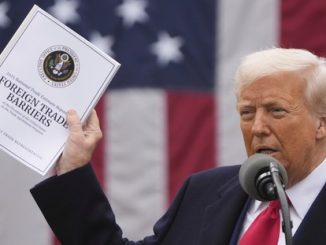
Police escort an alleged gang member to the Terrorism Confinement Center (CECOT) prison, at the El Salvador International Airport in San Luis Talpa, El Salvador, April 12, 2025.via REUTERS
| Published April 14, 2025
In a continued effort to address violent crime linked to illegal immigration, the United States deported 11 individuals over the weekend to El Salvador. Among those deported were seven alleged members of the Venezuelan prison gang Tren de Aragua and one suspected MS-13 gang member. The remaining individuals had criminal records involving serious offenses such as rape, terrorist threats, assault, and robbery.
This action is part of President Trump’s expanded deportation operations, which have sent over 200 suspected gang members to El Salvador’s mega prison in recent weeks. The deportations preceded a scheduled meeting between President Trump and El Salvador’s President Nayib Bukele, underscoring their countries’ developing security alliance.
The use of the 1798 Alien Enemies Act has been a cornerstone of the administration’s strategy, allowing for expedited deportations of individuals deemed threats to national security. Despite legal challenges and a temporary halt by a federal judge, the Supreme Court recently permitted the continuation of these deportations.
El Salvador’s President Bukele has expressed support for these measures, offering to house deported individuals in the country’s Terrorism Confinement Center (CECOT), a facility designed to detain high-risk criminals. This collaboration reflects a growing partnership between the U.S. and El Salvador in combating transnational crime.
While the administration touts these deportations as a necessary step for national security, human rights organizations have raised concerns about due process and the conditions within CECOT. The debate continues as the U.S. navigates the complexities of immigration enforcement and international cooperation.
Implications:
Here are the key implications of the U.S. deporting 11 violent illegal migrants—including gang members—to El Salvador, as covered in the New York Post article:
🇺🇸 1. Renewed Focus on Public Safety and Border Security
-
The move signals a firm stance by the Trump administration on cracking down against violent illegal migrants.
-
It reinforces the idea that national security and crime reduction are top priorities, especially as public concern grows over border enforcement failures in recent years.
 Alleged members of the Tren de Aragua and MS-13 gangs, recently deported by the US government, inside a cell at the Terrorism Confinement Center (CECOT).via REUTERS
Alleged members of the Tren de Aragua and MS-13 gangs, recently deported by the US government, inside a cell at the Terrorism Confinement Center (CECOT).via REUTERS
⚖️ 2. Legal Precedent and Expansion of Executive Power
-
The use of the 1798 Alien Enemies Act—an obscure law—is setting a new legal precedent in modern immigration enforcement.
-
Its revival could open the door for broader executive authority over immigration-related deportations in cases of national threat designation.
🤝 3. Strengthening U.S.–El Salvador Relations
-
El Salvador’s willingness to house violent deportees in its high-security “mega prison” (CECOT) deepens the bilateral relationship.
-
This growing alliance may lead to further regional cooperation on gang activity, illegal migration, and counterterrorism.
🧨 4. Highlighting Transnational Gang Threats
-
With deportees including members of Tren de Aragua (a notorious Venezuelan prison gang) and MS-13, the story underscores the global nature of criminal networks operating through the U.S. southern border.
-
This may justify broader international crime prevention efforts and more rigorous vetting of migrants.
 Ten more violent illegal migrants were deported from US to El Salvador over the weekend.via REUTERS
Ten more violent illegal migrants were deported from US to El Salvador over the weekend.via REUTERS
⚠️ 5. Human Rights and Due Process Concerns
-
Critics argue that expedited deportations under the Alien Enemies Act risk bypassing due process, raising alarms from civil liberties and immigration advocacy groups.
-
Concerns also persist over conditions at El Salvador’s CECOT prison, which has been criticized for its harsh treatment of inmates.
🗳️ 6. Political Impact Ahead of the 2026 Elections
-
This aggressive immigration enforcement is likely to energize Trump’s “America First” voter base.
-
However, it could also intensify polarization, with opponents framing the policy as excessively authoritarian or xenophobic.
🌎 7. Potential Model for Other Countries
-
The collaboration between the U.S. and El Salvador could become a blueprint for other bilateral migrant-return deals, especially in Central America.
-
Nations grappling with illegal migration and crime might follow suit—if they have the infrastructure and political will.
🚨 Overall Takeaway:
The U.S. government’s weekend deportation of violent illegal migrants, including dangerous gang members from Tren de Aragua and MS-13, marks a bold escalation in the Trump administration’s war on transnational crime. By invoking the rarely used Alien Enemies Act, the administration is sending a clear message: national security comes first, and violent actors will be removed—fast.
This move isn’t just about law enforcement—it’s about reshaping immigration policy around security, sovereignty, and strategic alliances. With El Salvador stepping up to detain these criminals in its high-security mega prison, a new model of international cooperation is forming.
But while many applaud the strong stance, critics warn of potential human rights abuses and legal overreach. Still, for Trump supporters and border hawks, this is a long-overdue course correction—and a preview of how immigration enforcement may look if current trends continue.
SOURCES: THE NEW YORK POST – 11 more violent illegal migrants — including 7 Tren de Aragua gangbangers — deported from US to El Salvador over the weekend
ABC NEWS 10 – El Salvador’s offer to take in US deportees and violent criminals is unlike any other migrant deal
ANADOLU AJANSI – White House says it did not violate written court order when it deported migrants to El Salvador





Be the first to comment